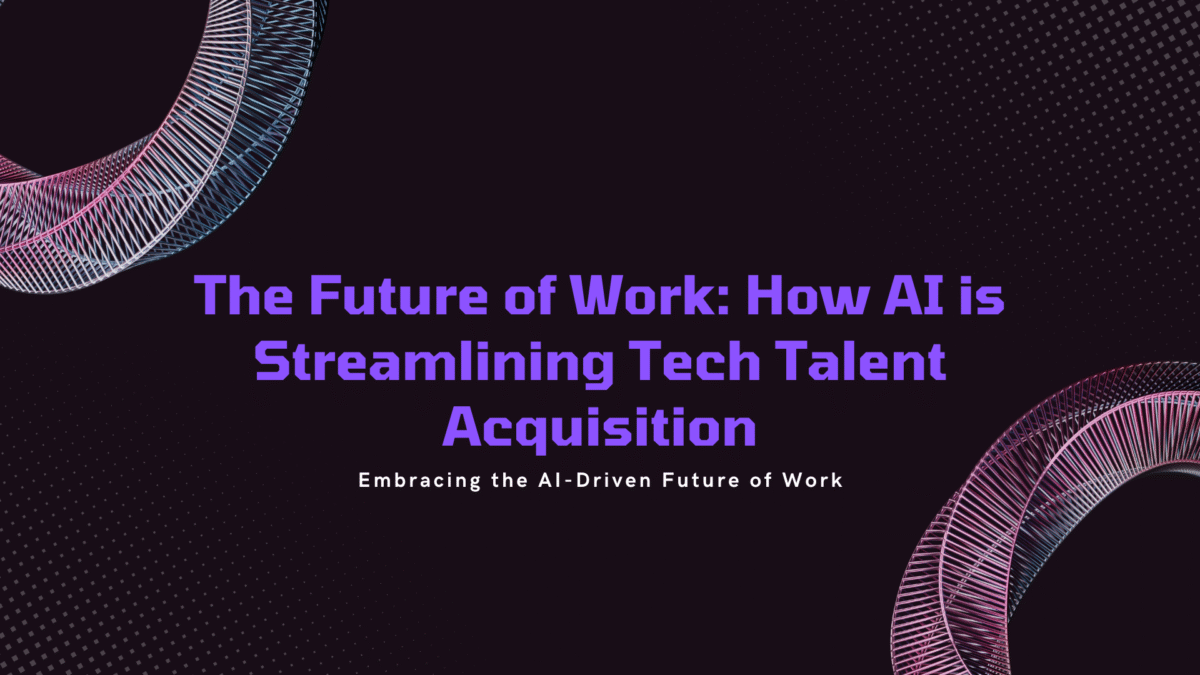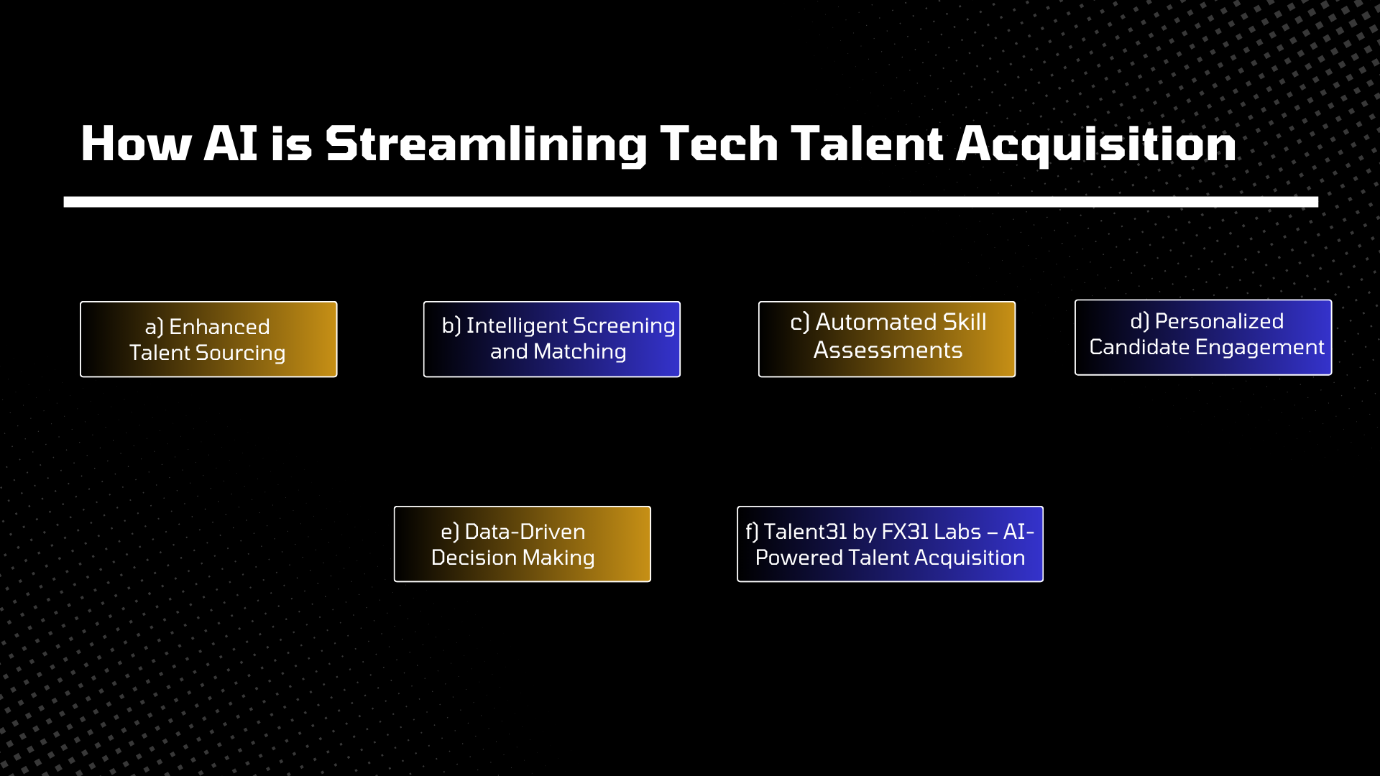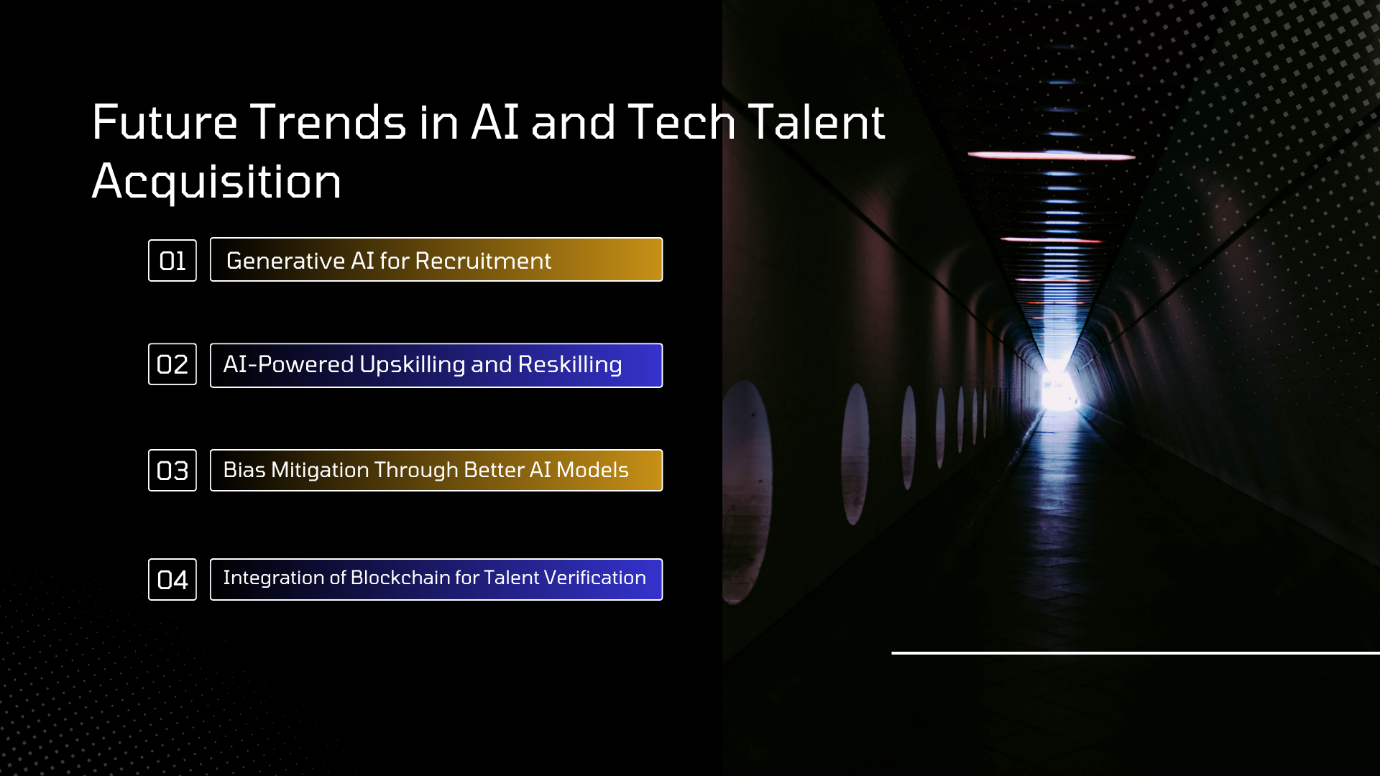The Future of Work: How AI is Streamlining Tech Talent Acquisition

Introduction: Shifting Landscapes in Talent
Tech Talent Acquisition has undergone a dramatic transformation over the past decade. Traditional methods—manual sourcing, lengthy interviews, and generalized recruitment drives—are quickly being replaced by smarter, more agile solutions. Companies are no longer confined to local talent pools; they’re reaching across continents, leveraging Nearshore & Offshore Engineering Talent to fill skill gaps faster and more efficiently.
At the heart of this transformation lies Artificial Intelligence (AI). AI-driven systems are revolutionizing how companies identify, evaluate, and onboard tech professionals. In a world increasingly reliant on Tech Talent Augmentation, companies that harness AI’s power gain a significant competitive edge. Today, organizations that once spent months recruiting developers can now do so in weeks—or even days—thanks to AI and Machine Learning Services.
As businesses continue to navigate the challenges of digital transformation, the question isn’t whether AI will reshape talent acquisition—it’s how quickly you can adapt to it.
The Rise of AI in Recruitment and Talent Acquisition
Why AI Now?
AI’s integration into recruitment isn’t just a technological evolution; it’s a necessity. The pandemic accelerated remote work and globalized teams. Startups and enterprises alike now source Nearshore Staff Augmentation or Offshore Staff Augmentation talent to bridge gaps swiftly. However, manually sifting through thousands of resumes or coordinating dozens of interviews across time zones is impractical.
AI and Machine Learning Solutions step in to automate and optimize key stages:
- Candidate Sourcing: AI tools crawl public databases, LinkedIn, and niche platforms to find passive candidates.
- Resume Screening: Natural Language Processing (NLP) algorithms analyze resumes, matching skills and experience with job descriptions.
- Interview Scheduling: AI chatbots manage scheduling, reducing human coordination time.
- Skill Assessments: AI-powered platforms provide automated coding tests, soft skill analysis, and culture-fit assessments.
- Bias Reduction: Machine learning models can be trained to ignore demographics like age, gender, and ethnicity, focusing solely on skills and experience.
According to a LinkedIn report, 67% of hiring managers say AI has helped them save time in the recruitment process. Another study by Gartner predicts that by 2025, 75% of HR inquiries will be initiated through conversational AI platforms.
Reference: LinkedIn Global Talent Trends Report
How AI is Streamlining Tech Talent Acquisition

AI’s role isn’t limited to just making recruitment faster; it is making it smarter. Here’s how it fundamentally changes tech hiring, especially when looking for Nearshore & Offshore Engineering Talent or scaling through IT Staff Augmentation Services:
a) Enhanced Talent Sourcing
Previously, finding top developers from Brazil, Mexico, or Latin America could take months. Now, AI platforms equipped with predictive analytics and big data mining can instantly match job requirements to available talent across global talent pools. This means companies no longer have to rely on expensive headhunters or slow traditional recruitment methods.
For example, AI systems analyze a company’s historic hiring success—what skills, experiences, and personality types led to high-performing hires—and recommend candidates with similar traits.
b) Intelligent Screening and Matching
With Generative AI Development Services like ChatGPT integrations, recruiters can now automatically create tailored screening questions or even simulate initial conversations with candidates. AI-driven Applicant Tracking Systems (ATS) prioritize candidates based on how closely they match the role.
Plus, AI can scan GitHub profiles, coding challenge results, Stack Overflow contributions, and other digital footprints to identify genuine technical expertise rather than relying only on self-reported resumes.
c) Automated Skill Assessments
Using AI-powered platforms, companies can conduct real-time skill evaluations. Whether it’s a coding test, a system design challenge, or a debugging exercise, the AI can assess:
- Code quality
- Problem-solving approach
- Creativity in solution building
- Time taken and accuracy
These evaluations offer a far more nuanced understanding of a developer’s skills compared to a basic multiple-choice quiz.
d) Personalized Candidate Engagement
Engaging top tech talent is as important as identifying it. AI-driven CRMs (Candidate Relationship Management tools) send personalized updates, reminders, and job opportunity alerts to candidates, ensuring they stay warm throughout the process.
This is especially crucial for Nearshore Staff Augmentation and Offshore Staff Augmentation, where candidates might be considering multiple global offers.
e) Data-Driven Decision Making
Modern AI recruiting platforms offer detailed analytics—time-to-hire, candidate satisfaction scores, sourcing effectiveness, and much more. This helps organizations fine-tune their strategies and increase ROI on their hiring efforts.
f) Talent31 by FX31 Labs – AI-Powered Talent Acquisition
One standout solution at the intersection of AI and hiring is Talent31, a next-gen recruitment platform by FX31 Labs. Designed specifically for B2B tech hiring, Talent31 leverages proprietary AI algorithms to:
- Rapidly match job roles with global tech talent across nearshore and offshore markets
- Automate resume screening and skill validations
- Provide predictive success analytics based on past hiring data
- Streamline the entire recruitment funnel—from sourcing to onboarding—within a single unified dashboard
Whether you’re scaling your engineering team or building a global delivery center, Talent31 empowers hiring managers to cut time-to-hire by up to 50% while improving both quality and fit.
Tech Talent Augmentation: AI’s Role in Building the Future Workforce
As industries pivot toward digital-first operations, the demand for specialized tech skills has never been higher. Yet, the traditional hiring model struggles to keep up with this pace. Enter Tech Talent Augmentation—an approach where companies can quickly plug skill gaps with global expertise, particularly through Nearshore & Offshore Engineering Talent.
a) How AI Enhances Tech Talent Augmentation
AI algorithms have transformed the way companies approach talent augmentation by:
- Real-Time Talent Pool Analysis: AI tools monitor the global labor market continuously, identifying available experts in key regions like Latin America, Brazil, and Mexico.
- Predictive Hiring Models: Machine learning predicts future talent needs based on project pipelines, market trends, and historical hiring data.
- Optimal Team Formation: Beyond finding individuals, AI suggests optimal team compositions for projects based on complementary skills and past collaboration success.
This new wave of IT Staff Augmentation Services empowered by AI and Machine Learning Solutions makes it possible for companies to staff projects in days instead of months, ensuring speed-to-market without compromising on quality.
b) Nearshore and Offshore Talent: Why It Matters
Choosing Nearshore Staff Augmentation or Offshore Staff Augmentation options has additional benefits:
- Time Zone Compatibility: Working with engineers in Latin America enables easier collaboration with U.S.-based companies.
- Cost-Effectiveness: Offshore locations offer competitive rates without sacrificing technical excellence.
- Diversity and Innovation: Teams with diverse backgrounds foster innovation, essential in fields like AI, fintech, and robotics.
Leading firms today are integrating AI ML Development Company services into their augmentation strategies to ensure their remote teams are not just hired quickly, but are also continuously upskilled with AI-curated learning paths.
Future Trends in AI and Tech Talent Acquisition

The future of tech recruitment will be shaped by how companies embrace AI-driven transformations. Here are key trends to watch:
a) Generative AI for Recruitment
With the rise of Generative AI Development Services, recruitment processes will become hyper-personalized. Job descriptions will adapt dynamically based on candidate engagement, and interview questions will evolve in real-time to better assess a candidate’s skills.
Future platforms will integrate Generative AI Integration Services to automatically create customized onboarding plans, learning paths, and even personalized career progression routes.
b) AI-Powered Upskilling and Reskilling
As technology evolves, static skills become obsolete. Companies will invest heavily in AI-driven platforms that assess employees’ skills in real-time and recommend micro-learning courses to bridge gaps.
This will be critical for industries like fintech, AI development, and robotics, where innovations occur at breakneck speed.
c) Bias Mitigation Through Better AI Models
While AI has the potential to reduce bias, poorly trained models can reinforce it. The next generation of AI Integration Services will focus on explainable AI—ensuring that every decision made during hiring is transparent and auditable.
Regulatory bodies across the U.S. and EU are moving toward stricter audits on AI in recruitment, pushing companies to adopt responsible AI practices.
d) Integration of Blockchain for Talent Verification
Blockchain could become a core tool for verifying candidates’ educational qualifications, work history, and certifications, drastically reducing fraud. This complements AI screening and adds another layer of trust.
Challenges and Ethical Considerations
Despite the tremendous potential, integrating AI into talent acquisition isn’t without challenges.
a) Data Privacy Concerns
Using AI in recruitment requires processing massive amounts of personal data. Companies must ensure compliance with GDPR, CCPA, and other data protection laws. Mishandling data can lead to hefty fines and reputational damage.
b) Algorithmic Bias
Even the best AI models can inherit human biases if not properly trained. There have been instances where recruitment AIs inadvertently favored certain demographics. Continuous audits, diverse training datasets, and ethical AI design are crucial.
c) Overreliance on Technology
While AI can enhance decision-making, the human element in recruitment—empathy, gut feeling, and cultural fit judgment—remains irreplaceable. Companies must find the right balance between automation and human interaction.
Conclusion: Embracing the AI-Driven Future of Work
The landscape of talent acquisition is undergoing a seismic shift. In an era where speed, precision, and global reach define success, AI and Machine Learning Services are no longer optional—they’re essential.
From Tech Talent Augmentation to Nearshore & Offshore Staff Augmentation, companies leveraging AI aren’t just filling roles faster—they’re building smarter, more resilient organizations ready for the future of work. The key lies in choosing the right partners and platforms—those offering ethical, transparent, and responsible AI-powered solutions.
One such platform leading the charge is Talent31 by FX31 Labs. Purpose-built for high-velocity, AI-driven recruitment, Talent31 empowers companies to match global tech talent with roles in real-time—reducing time-to-hire by up to 50% while elevating quality, fit, and team performance.
As AI continues to evolve, businesses that embrace its full potential today will become tomorrow’s leaders in innovation and growth.
The future of work is already here—the only question is: are you ready to meet it head-on?
Ready to transform your tech hiring strategy?
Discover how Talent31 by FX31 Labs can help you hire smarter, faster, and globally.
👉 Schedule your free demo today or visit talent31 to learn more.
